Search the Blog
Categories
- Books & Reading
- Broadband Buzz
- Census
- Education & Training
- Friday Reads
- General
- Grants
- Information Resources
- Library Management
- Nebraska Center for the Book
- Nebraska Libraries on the Web
- Nebraska Memories
- Now hiring @ your library
- Preservation
- Pretty Sweet Tech
- Programming
- Public Library Boards of Trustees
- Public Relations
- Talking Book & Braille Service (TBBS)
- Technology
- Uncategorized
- What's Up Doc / Govdocs
- Youth Services
Archives
Subscribe
Author Archives: Susan Knisely
Computers in Libraries and Internet Librarian Connect 2020 Conference Discount
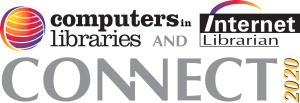
The 35th Computers in Libraries, scheduled to run from September 21, 2020 through September 25, 2020, is going VIRTUAL, along with Internet Librarian. Despite this change to an online venue, the Nebraska Library Commission, in cooperation with Information Today, is still able to offer a discount to Nebraska librarians who’d like to register to attend virtually.
For more information about the conference, including a schedule, session descriptions, and a list of speakers, view the conference website.
There will only be one pass type for this event: The All Access Virtual Pass. This pass includes access to all sessions, networking, and the virtual exhibit hall. It also includes access to archived session recordings for later viewing.
The discounted rate being offered to Nebraska librarians is $149 (regular $199). To receive this rate you must input our assigned discount code during registration.
Registration link: https://pheedloop.com/cilil2020/site/register/
Discount Code: NLCVirtual
If you have questions, please contact Susan Knisely.
Posted in Education & Training, Technology
Leave a comment
Friday Reads: Sigh, Gone: A Misfit’s Memoir of Great Books, Punk Rock, and the Fight to Fit In, by Phuc Tran
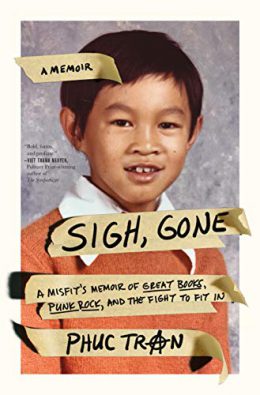
I love memoirs. Not only do they offer readers insight into what it’s like to live lives different from their own, they also remind us of how much we humans have in common. That’s definitely the case with Sigh, Gone: A Misfit’s Memoir of Great Books, Punk Rock, and the Fight to Fit In, by Vietnamese American teacher, writer, and tattoo artist Phuc Tran.
In 1975, when Tran was one, his family fled the fall of Saigon and wound up resettled in Carlisle, Pennsylvania. In Sigh Gone, Tran describes what it was like growing up as a member of “the token refugee family” (2) in town. As one can imagine, it included schoolyard taunts and name-calling, and, when out in public with his family, the discomfort of always sticking out.
Tran also describes the resentment he felt toward his parents over what he saw, at the time, as their cultural and English language failings: “I needed to trust in my dad’s ability to navigate the world at large, and I was already doubting him. . . . Five-year-olds were supposed to believe what their parents said. Maybe some kids’ parents still had the golden nimbus of infallibility, but not my parents and not for me” (16).
Going forward, Tran chronicles his relentless efforts to assimilate. By high school, his two-pronged strategy included pursuit of academic excellence and successful integration into the punk/skater subculture. Of the later, he writes, “[b]eing a freak because of my weird clothes and hair was a respite. These were things that I had chosen . . . Fighting rednecks because you were a punk was far better than fighting because you were Asian, and fighting with allies was far better than fighting alone” (6).
So why did this book resonate with me? For one, Tran’s depiction of high school, with its cliques and angst—a “cultural cul-de-sac built with the craftsman blueprint of John Hughes, the Frank Lloyd Wright of teen malaise” (2)—is viscerally familiar. His description of his job as a library page also warmed my librarian’s heart, as did his discovery and adoption of Clifton Fadiman’s The Lifetime Reading Plan, which he stumbled on while prepping for the library’s used book sale.
Though the Plan, was “unapologetically American, classist, and white” (4), Tran could not have cared less at the time; it served as a catalyst for his burgeoning love of literature–which the English major in me appreciated. He also viewed the Plan as his entrée to the world of big ideas that can connect people across time, geography, and culture—which is what Tran, himself, has accomplished with this memoir. Sigh, Gone concludes right after Tran graduates from high school, just as he’s poised to head off to Bard College, which had described itself to him in its admissions literature as “A Place to Think” (267). So fitting!
Friday Reads: Tightrope: Americans Reaching for Hope, by Nicholas D. Kristof and Sheryl WuDunn

Tightrope, by married, Pulitzer Prize-winning journalists Nicholas Kristof and Sheryl WuDunn, is one of a number of recent books spotlighting the hopelessness and dysfunction that have decimated working-class America. In the 1970s, when Kristof was growing up in Yamhill, Oregon, working-class parents with good-paying union jobs had better lives than their parents did; everyone anticipated their children, with more education, would do better still. Sadly, that wasn’t the case. And, as the authors argue, this squandered potential hurts not just individuals who find themselves on a downward trajectory; it hurts the country as a whole.
Kristof and WuDunn document this reversal of fortune with extensive data, tracking declining median wages, life expectancy, educational achievement, and more. Citing the Social Progress Index, they point out that the United States now “rank[s] number 32 in internet access, number 39 in access to clean drinking water, number 50 in personal safety and number 61 in high-school enrollment…. Overall, the Social Progress Index ranks the United States number 25 in well-being of citizens, behind all the other members of the G7 as well as significantly poorer countries like Portugal and Slovenia” (13-14).
Kristof and WuDunn approach this topic not just through statistics, though. They humanize the crisis by sharing stories of friends and neighbors Kristof grew up with in Yamhill, Oregon, many of whose lives unraveled due to poverty, unemployment, substance abuse, incarceration, and despair. Here’s one stark metric they use to illustrate the extent of the problem: “About one-fourth of the kids who rode with Nick on the [school] bus are dead from drugs, suicide, alcohol, obesity, reckless accidents and other pathologies” (8).
Because Kristof grew up with many of his subjects and has had a lifelong relationship with them, he sees and portrays them as individuals possessing strengths and weaknesses. He acknowledges the bad choices they’ve made, but he’s also aware of their talents, their untapped potential, and the points at which their families, their schools, and punitive social policies let them down. Based on this insight, Kristoff and WuDunn contend that to address this crisis, we need to “transcend the customary narrative that focuses only on ‘personal responsibility’ and on glib talk about lifting oneself up by the bootstraps” (19). Additionally, we need to consider seriously what our collective responsibility is and should be.
Kristof, Nicholas D., and Sheryl WuDunn. Tightrope: Americans Reaching for Hope. New York. Alfred A. Knopf, 2020.
Value Line Library Database Trial (through 2/29/20)

Value Line is offering Nebraska libraries trial access to their online investment research service during the month of February.
Description: Value Line Library Research Center is a single, cost-effective research package covering multiple asset classes, combining the built-in speed, convenience, accuracy, and functionality that can transform an average investor into an extremely profitable one. Contains research on stocks, mutual funds, ETFs, Options, and a special investment portfolio model. Read more about Value Line Library Research Center online, or view a video.
Trial access instructions (URL, username, password) were distributed via a January 31, 2020 message to the TRIAL mailing list. Nebraska librarians who didn’t receive this information or would like to have it sent to them again may contact Susan Knisely.
Note: Not all trial announcements are posted to this blog. If you are a Nebraska librarian and you’d like to receive future database trial announcements directly in your inbox, please make sure you are signed up for the Nebraska Library Commission’s Trial mailing list.
Posted in Information Resources, Technology
Leave a comment
Friday Reads: Exile from Eden, by Andrew Smith

Exile from Eden, the featured title in this Friday Reads, is the sequel to Andrew Smith’s 2014 apocalyptic novel, Grasshopper Jungle, which I claimed as my new favorite book in a July 15, 2016 Friday Reads. I guess, therefore, this is a sequel Friday Reads.
Exile from Eden begins sixteen years after six-foot-tall praying mantises with a taste for human flesh forced Austin Szczerba, Robby Brees, and Shann Collins, along with Robby’s mother, Connie Brees, her boyfriend, Louis Sing, Shann’s mother and stepfather, Wendy and Johnny McKeon, and Austin’s dog, Ingrid, to hole up in an underground bunker, called Eden. During these sixteen years, Johnny McKeon and Ingrid have died, and Arek Szczerba and Mel Sing have been born. Arek is the son of Austin and Shann, though he considers Robby his second father. Mel is the daughter of Connie and Louis.
Narrated by sixteen-year-old Arek, Exile from Eden tells the story of what happens when he and fifteen-year-old Mel leave Eden (or, as Arek calls it, “the hole”) to search for Austin and Robby, who have failed to return from one of their regular supply-gathering missions. A road trip adventure ensues. As was the case with Grasshopper Jungle, however, Exile from Eden is about so much more than a mere plot summary would suggest. After all, as Austin stated in Grasshopper Jungle, “[g]ood books are about everything.”
In Grasshopper Jungle, Austin was obsessed with recording history and telling the truth. In Exile from Eden, Arek, his son, also ruminates on truth—how we construct it for ourselves and try to convey it to others: “All stories are true the moment they are told,” Arek states in the opening sentence of the book. “Whether or not they continue to be true is up to the listener” (3).
Because he was born and raised in the hole, Arek has no firsthand knowledge of the before-the-hole world, and extremely limited exposure to the new post-apocalyptic world outside the hole. To address this deficit, his father, Austin, brings back artifacts—including books, maps, and paintings—to try to build a model of the world for Arek. As Arek discovers after leaving the hole, however, “the model . . . is not the thing” (110). This leads him to further epistemological exploration of what we can know and how we can know it:
. . . My father’s model of the world was supposed to represent everything that was outside the hole. The only thing that can re-present anything real is the thing itself. No models can ever adequately perform that job.
The model presents—and re-presents—only the model, and nothing more.
And the data—what’s really outside the hole—does not call to us, so we must go to it, and then interpret its meaning with our incompetent human minds. The data is mute; we give it an imperfect voice. (110)
Exile from Eden juxtaposes the before-the-hole world, with its rules and protocols, shame and inhibitions, with the terrifying, unstructured freedom offered by the after-the-hole world. In Eden, Arek’s grandmother, Wendy–“SPEAKER OF LAWS” (20), believer in following instructions, and segregator of the sexes—represents the pre-hole world. The promise of the post-hole world, on the other hand, is captured most powerfully by a line from Herman Melville’s Moby-Dick, recited by Arek’s father, Austin, after he and Arek finish reading the book aloud to each other: “In landlessness alone resides the highest truth, shoreless, indefinite as God” (244).
At one point, Austin tells Arek “you and Mel are like the first humans on earth. You are the new people, without the baggage everyone carried with them, without end, from before” (188). Indeed, after months outside the hole, Arek describes Mel and himself as “joined to the world outside, not as pieces of a model, but as the thing itself” (347).
In the final chapter, when he and Mel finally reunite with Austin and Robby, Arek, channeling Melville, describes himself as “Shoreless Man.” And when Austin asks how he likes it outside the hole, Arek replies “There are no rules, and it’s wild” (353). Based on the premise set up throughout the book, this is a good thing and a happy ending.
Smith, Andrew. Exile from Eden. New York: Simon & Schuster Children’s Publishing, 2019.
Computers in Libraries 2020 Conference (March 31 – April 2)

The Nebraska Library Commission is offering a group discount to all Nebraska librarians who attend the Computers in Libraries 2020 conference. This year it will be held at the Hyatt Regency Crystal City, Arlington, VA, on March 31st through April 2nd, 2020. Detailed information about the conference can be found on the conference web page.
This year the Gold Pass will be available for the group rate of $629 (regular rate is $819). The Full 3-day Pass will be $359 (regular rate is $519). (No discount rates are available for the preconference workshops, unless purchased as part of a Gold Pass.)
In addition, discount prices of $599 (regular $719) on the Library Leaders Summit (includes all three days of CIL), and $149 (regularly $219) on the Internet@Schools Track are also available.
To receive the discount:
- Go to the Computers in Libraries 2020 Registration page:
http://computersinlibraries.infotoday.com/2020/Registration.aspx - Click on the Register Now graphic at the top of the page.
- Type priority code NLC20 in the Priority Code field at the top of the form, and click the “Activate Code” button. Discounted rates should appear on the registration form after you successfully activate the code. If you don’t see the discounted rates on the form, please contact Susan Knisely for assistance.
- Complete and submit the online form by the February 28th deadline.
Deadline: Online registrations can be made until February 28th to receive the discounted rates. After this time, rates will go up by $20.
Posted in Education & Training, Technology
Leave a comment
Friday Reads: Say Nothing: A True Story of Murder and Memory in Northern Ireland, by Patrick Radden Keefe
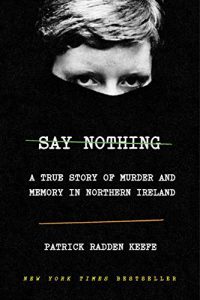
Growing up in the ’70s and ’80s, I was aware of sectarian violence in Northern Ireland—I heard news reports of IRA bombings and hunger strikes—but I definitely didn’t have a clear understanding of the issues. Therefore, when Patrick Keefe published Say Nothing: A True Story of Murder and Memory in Northern Ireland to rave reviews earlier this year, I figured it would be an educational and engaging read. I wasn’t disappointed.
As its subtitle suggests, Say Nothing follows some conventions of the true crime genre. The book begins with the 1972 abduction of Jean McConville, a mother of 10, from her apartment in a public housing complex in West Belfast. Twenty-some chapters later, in 2003, her remains are uncovered on a beach in the Republic of Ireland, just south of the border with Northern Ireland. A pathologist’s report suggests she died from a single gunshot to the back of the head.
The “whodunit” thread definitely runs throughout the narrative, sometimes surfacing as a major plot point, but just as often fading into the background. My sense is that Keefe’s primary interest is in using McConville’s disappearance as a springboard for his broader exploration of the period known as the Troubles—three decades of violence centered in Northern Ireland, beginning in the late 1960s and running through approximately 1998.
My takeaways from reading the book include a more granular understanding of the differences between the Official IRA, the Provisional IRA, and Siin Féin; greater awareness of the various roles played by Gerry Adams during the Troubles, as well as insight into why he is such a controversial figure; and the sobering realization that Bobby Sands was actually one of ten hunger strikers who died at intervals over the summer of 1981.
Say Nothing is exactly the kind of nonfiction book I enjoy. It taught me something new without giving off a dry textbook vibe. It’s also given me a more nuanced understanding of how tensions from the past inform present day concerns—in this instance, related to Brexit. Chief among these concerns is what impact the United Kingdom’s exit from the European Union will have on the border between Northern Ireland and the Republic of Ireland.
Speculation also swirls that Brexit may tip the scale toward Irish unification—a longstanding republican dream. As Keefe writes, “[i]t would be ironic, to say the least, if one inadvertent long-term consequence of the Brexit referendum was a united Ireland—an outcome that three decades of appalling bloodshed and some thirty-five hundred lost lives had failed to achieve.”
Overall, this book is a powerful reminder of William Faulkner’s assertion that “[t]he past is never dead. It isn’t even past.”
Keefe, Patrick Radden. Say Nothing: A True Story of Murder and Memory in Northern Ireland. New York: Doubleday, 2019.
EBSCO Database Trial
 EBSCO is offering Nebraska libraries trial access to three databases beginning August 1 and running through October 27, 2019.
EBSCO is offering Nebraska libraries trial access to three databases beginning August 1 and running through October 27, 2019.
Databases available for trial include:
- Hobbies & Crafts Reference Center
- Home Improvement Reference Center
- Small Engine Repair Reference Center
Trial access instructions (URL, username, password) were distributed via an August 1, 2019 message to the Trial mailing list. Nebraska librarians who didn’t receive this information, or who would like to have it sent to them again, may contact Susan Knisely.
To request a price quote, contact Susan Knisely at the Nebraska Library Commission. Please indicate which of the three databases you are interested in.
*** Note: Not all trial announcements are posted to this blog. If you are a Nebraska librarian and you’d like to receive future database trial announcements directly in your inbox, please make sure you are signed up for the Nebraska Library Commission’s Trial mailing list.
Posted in Information Resources, Technology
Leave a comment
Brush Up On NebraskAccess Statewide Databases With NEW Training Videos
Do you feel like your NebraskAccess database-searching skills are getting rusty? Or maybe you’re new to the Nebraska library world and haven’t had a chance to dip into the databases yet? If either scenario sounds familiar, you might want to check out our NEW short training videos. Ten videos are available so far. The shortest video is just under three minutes and the longest is just over fifteen.
Links to these new training videos appear on the Librarian’s Toolbox: Help page:

Links to individual videos also appear on database-specific “About” pages. On the Databases Available to Nebraskans page, click on the question mark icon to the right of a database logo/annotation to access the “About” page for that database:
![]()
If we’ve created a training video for that database, it will appear in the “Help Resources from the Nebraska Library Commission Staff” section of that database’s “About” page:
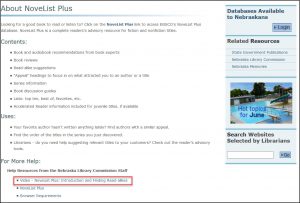
We hope the information and search examples included in these videos will give you an extra boost of confidence when searching and promoting the NebraskAccess databases. Let us know what you think!
Posted in Education & Training, Technology
Leave a comment
Internet Librarian Conference (Oct 21-23) Discount
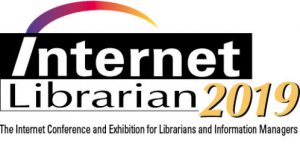 The Nebraska Library Commission is offering a group discount to all librarians in Nebraska who attend the 2019 Internet Librarian Conference. This year it will be held at the Monterey Marriott in Monterey, California on October 21-23, 2019. Detailed information about the conference can be found on the conference web page.
The Nebraska Library Commission is offering a group discount to all librarians in Nebraska who attend the 2019 Internet Librarian Conference. This year it will be held at the Monterey Marriott in Monterey, California on October 21-23, 2019. Detailed information about the conference can be found on the conference web page.
As in the past, InfoToday is offering select groups the opportunity to participate in their Group Discount Program. The Gold Pass is available to groups at the discounted rate of $649 (regularly $819 and the only pass to include preconference workshops). They are also offering a special rate of $399 for the 3-Day Pass (regular rate is $549). (No discount rates are available for the separately priced preconference workshops.)
In addition, the discount rate of $119 (regularly $209) on the Internet@Schools Track is also available.
To receive the discount
- Go to the Internet Librarian 2019 Registration page.
- Click on the Register Now graphic at the top of the page.
- Type priority code 19NLC in the Priority Code field at the top of the form, and click the “Activate Code” button. Discounted rates should appear on the registration form after you successfully activate the code. If you don’t see the discounted rates on the form, please contact Susan Knisely for assistance.
- Complete and submit the online registration form by the September 20th deadline to receive the discounted rates. Rates will go up by $20 after the deadline.
Posted in Education & Training, Technology
Leave a comment
Friday Reads: The Size of the Truth, by Andrew Smith
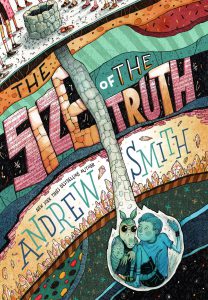 Andrew Smith is best known for writing young adult novels that range from darkly humorous and apocalyptic, like Grasshopper Jungle and Rabbit & Robot, to angst-filled and realistic, like Winger and Stand-off. In a notable departure, Smith just debuted his first middle grade book, the mostly realistic but tiny bit surreal The Size of the Truth. It’s a prequel of sorts, filling in the backstory of Sam Abernathy, Ryan Dean’s precocious, cooking-show-loving roommate from Stand-off.
Andrew Smith is best known for writing young adult novels that range from darkly humorous and apocalyptic, like Grasshopper Jungle and Rabbit & Robot, to angst-filled and realistic, like Winger and Stand-off. In a notable departure, Smith just debuted his first middle grade book, the mostly realistic but tiny bit surreal The Size of the Truth. It’s a prequel of sorts, filling in the backstory of Sam Abernathy, Ryan Dean’s precocious, cooking-show-loving roommate from Stand-off.
Sam narrates The Size of the Truth, jumping back and forth in time between the defining experience of his young life, which occurred when he was four and got trapped at the bottom of a well for three days, and his present, as an eleven-year-old eighth grader dealing with baggage left over from that event. The baggage includes severe claustrophobia and an inability to escape his identity, in Blue Creek, Texas, as “The Little Boy in the Well.” It also infects Sam’s relationship with his parents, who plot out every aspect of his life in an obsessive effort to “[make] sure [he’d] never have the freedom to fall into unseen holes in [his] future” (71). (Their version of his life involves Science Club, AP Physics, Blue Creek Magnet High School, and MIT, as opposed to the culinary school Sam aspires to attend.) Sam, for his part, goes along with this micromanagement because he doesn’t want to “do something as foolish as fall into a hole and disappoint [his] parents ever again” (71).
Sam’s challenge, in the course of this story, is to internalize the truth imparted to him by a probably-not-real talking armadillo named Bartleby (this is the surreal element referenced above), who he remembers visiting him during his time in the well: “don’t go living your life only trying to avoid holes” (172). Sam also needs to learn that other people aren’t always who he’s believed them to be either—most notably, James Jenkins, the older “murderous” boy Sam has always blamed for the well incident. (Everyone in Blue Creek assumes James is destined for football stardom when, unbeknownst to them, he has a whole other identity in Austin, Texas, where his mother lives.)
I don’t know how middle school me would have responded to Smith’s latest book, but it definitely strikes a chord with adult me. In particular, as the mother of a 17-year-old who I want to not only protect but also see flourish and succeed, it’s a good reminder of the damage we do when we project our expectations on to others, filling in their blanks without really listening to their truth.
Smith, Andrew. The Size of the Truth. New York: Simon & Schuster Books for Young Readers, 2019.
Friday Reads: Daring to Drive: A Saudi Woman’s Awakening, by Manal al-Sharif
 Daring to Drive is the memoir of Manal al-Sharif, a Saudi Arabian women’s rights activist who spent time in prison after participating in the 2011 Saudi women’s driving campaign. While the first two and final four chapters focus on her driving activism, the middle eight are a chronological account of her life, beginning on April 25, 1979, the day of her birth. In my view, the real drama of the narrative is in seeing how al-Sharif transforms from a young girl, strictly controlled by Saudi custom and a fundamentalist version of Islam, to a woman who challenges the status quo at great personal cost.
Daring to Drive is the memoir of Manal al-Sharif, a Saudi Arabian women’s rights activist who spent time in prison after participating in the 2011 Saudi women’s driving campaign. While the first two and final four chapters focus on her driving activism, the middle eight are a chronological account of her life, beginning on April 25, 1979, the day of her birth. In my view, the real drama of the narrative is in seeing how al-Sharif transforms from a young girl, strictly controlled by Saudi custom and a fundamentalist version of Islam, to a woman who challenges the status quo at great personal cost.
One value in reading an account like al-Sharif’s is the window it provides into the restrictive, brutal nature of Saudi life, especially for women. In Saudi Arabia women are completely dependent on male guardians (usually fathers or husbands) or on mahrams (male relatives whom they cannot marry, such as brothers, uncles, or even sons) to accompany them on any official business. To illustrate her point that in Saudi eyes “death is preferable to violating the strict code of guardianship and mahrams” (7), al-Sharif cites several cases where women died when male paramedics weren’t allowed to treat them because their guardians or mahrams weren’t present. And of course, women couldn’t drive, even if, like al-Sharif, they owned cars and had foreign driver’s licenses. (Note: Authorities finally lifted the ban on women driving on June 24, 2018.) Instead, women relied on, and frequently suffered harassment by, male taxi drivers or “an informal network of men with cars who illegally transport female passengers” (9).
For the most part, the cultural landscape al-Sharif describes appears quite alien. Occasionally, though, one feels an uncomfortable flicker of familiarity. For example, on the topic of harassment al-Sharif writes “the authorities . . . always blame the woman. They say she was harassed because of how she looked or because of the way she was walking or because she was wearing perfume. They make you the criminal” (11). al-Sharif’s decision to wear a hijab, which left her face uncovered, instead of a niqab, in public was seen by men as an invitation to shout slurs, like “whore” and “prostitute,” at her. The degree of coverage hardly seemed to matter though, as even a woman who left only her eyes exposed was reportedly told by religious police to cover them because they were “too seductive” (234).
So what allowed al-Sharif to reject the shackles of her culture? To achieve a broader perspective on Saudi customs and fundamentalist beliefs? After reading her memoir, I’d say that, in addition to innate curiosity, it was education, internet access, and exposure to people from other parts of the world – exactly the things repressive regimes and conservative religions invested in maintaining the status quo typically fear.
al-Sharif grew up with a mother who prioritized education for both her daughters and her son. And even though the schools al-Sharif attended growing up initially fanned the flames of her extremist religious beliefs, her academic achievements ultimately got her accepted to King Abdulaziz University in Jeddah. There, she received a small monthly allowance from the school, which gave her a first taste of financial independence. She also had her radical religious beliefs tested for the first time by fellow students who didn’t follow all the same practices she did. Perhaps most importantly, she signed up for internet access in order to complete and submit her homework. Though her original intent had been to avoid reading anything that might undermine her beliefs, she ultimately couldn’t resist exploring political analysis, world news, and diverse opinions. “Nothing,” she wrote, “did more to change my ideas and convictions than the advent of the Internet and, later, social media” (132-133).
Finally, after graduating, her university degree got her a good job at Aramco, the Saudi state oil company, where she worked with not only Saudi men, but also foreigners. In 2009, as part a professional exchange program, she got to live and work in the United States for a year. During this time abroad, she learned to drive, got a New Hampshire driver’s license, and rented a car at company expense. She went skiing and skydiving, got a public library card, attended a play in which two men kissed, learned about Rosa Parks and the civil rights movement, took up photography, and befriended a Jewish woman, none of which she could or would have done in Saudi Arabia. Her year in the United States was definitely a turning point for her; though she went back to Saudi Arabia at the end of it, she returned a completely different person. As she writes, “ the true culture shock occurred not when I landed in America, but much later, after I had returned home” (203). This is when her activism began in earnest.
al-Sharif, Manal. Daring to Drive: A Saudi Woman’s Awakening. New York: Simon & Schuster, 2017. Print.
Discounts on Books & Supplies for Nebraska Libraries
This message is a reminder that various library vendors offer Nebraska libraries discounts on books and supplies via the Nebraska Library Commission. You can see a list of these vendors on the Discounts on Books & Supplies page of the Nebraska Library Commission website.
 While some of these discounts are ongoing, others are offered for specific terms that are renewable. We are pleased to report that the following vendors have recently renewed their discount terms through at least the end of 2019:
While some of these discounts are ongoing, others are offered for specific terms that are renewable. We are pleased to report that the following vendors have recently renewed their discount terms through at least the end of 2019:
- Brodart
- Demco
- Ingram Library Services, Inc.
- Midwest Library Service
- The Library Store
- Vernon Library Supplies
Please see the Discounts on Books & Supplies page for a complete list of participating vendors, and also to see the discount terms and the steps required to obtain the discounts.
Posted in General
Leave a comment
Computers in Libraries Conference 2019 (March 26-28) Discount
 The Nebraska Library Commission is offering a group discount to all Nebraska librarians who attend the Computers in Libraries 2019 conference. this year it will be held at the Hyatt Regency Crystal City, Arlington, VA, on March 26-28, 2019. Detailed information about the conference can be found on the conference web page.
The Nebraska Library Commission is offering a group discount to all Nebraska librarians who attend the Computers in Libraries 2019 conference. this year it will be held at the Hyatt Regency Crystal City, Arlington, VA, on March 26-28, 2019. Detailed information about the conference can be found on the conference web page.
This year the Gold Pass will be available for the group rate of $629 (regular rate is $819). The Full 3-day Pass will be $359 (regular rate is $519). (No discount rates are available for the preconference workshops, unless purchased as part of a Gold Pass.)
In addition, discount prices of $599 (regularly $719) on the Library Leaders Summit (includes all three days of CIL), and $149 (regularly $219) on the Internet@Schools Track are also available.
To receive the discount:
- Go to the Computers in Libraries 2019 Registration page.
- Click on the “Register Now” graphic at the top of the page.
- Type priority code NLC19 in the Priority Code field at the top of the form, and click the “Activate Now” button. Discounted rates should appear on the registration form after you successfully activate the code. If you don’t see the discounted rates on the form, please contact Susan Knisely for assistance.
- Complete and submit the online form by the February 22 deadline.
Deadline: Online registrations must be submitted by February 22, 2019 to receive discounted rates.
Posted in Education & Training, Technology
Leave a comment
Friday Reads: Rabbit & Robot, by Andrew Smith
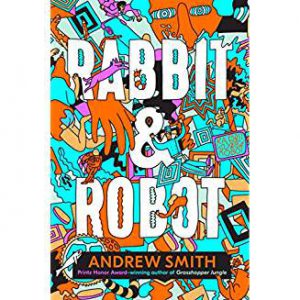 I’m a huge fan of Andrew Smith’s Grasshopper Jungle, so I’ve been anxiously anticipating his latest release, Rabbit & Robot. It arrived in my mailbox on Tuesday, September 25 (its release date), and I finished it this past weekend. Like Grasshopper Jungle, Rabbit & Robot is apocalyptic and darkly humorous; its plot unfolds in a similarly absurd fashion, and the social commentary is unmistakable.
I’m a huge fan of Andrew Smith’s Grasshopper Jungle, so I’ve been anxiously anticipating his latest release, Rabbit & Robot. It arrived in my mailbox on Tuesday, September 25 (its release date), and I finished it this past weekend. Like Grasshopper Jungle, Rabbit & Robot is apocalyptic and darkly humorous; its plot unfolds in a similarly absurd fashion, and the social commentary is unmistakable.
Rabbit & Robot is set in the future, at a time when regular people work as either bonks (soldiers) or coders. v.4 cogs, humanlike robots programmed by the coders, perform all other tasks that people “no longer wanted to waste their time doing” (57), including performing surgery, building roads, and caring for children.
As foreshadowed by one of the book’s epigraphs (“Education makes machines which act like men and produces men who act like machines” – Erich Fromm), schools are the primary mechanism for turning regular people’s children into bonks or coders. To facilitate this process, students receive carefully calibrated doses of Woz, a drug designed to help them learn. The ubiquitous and addictive Rabbit & Robot television program, “which was all about getting kids to embrace their inner bonks and coders” (33), reinforces this learning.
The book’s narrator, sixteen-year-old Cager Messer, and his best friend, Billy Hinman, are not regular kids: Cager’s father, the fifth richest man in America, owns a line of lunar cruise ships and is the creator of the Rabbit & Robot television show; and Billy’s father, the richest man in the world, owns the company that manufactures the world’s supply of cogs. Cager and Billy do not attend school and have never watched Rabbit & Robot. Billy has never taken Woz, but Cager, in his own words, is “pretty much an out-of-control addict” (24). The addiction is so bad, in fact, that Billy and Cager’s caretaker, Rowan, transport him to his father’s newest cruise ship, the Tennessee – “as big as a Midwestern city, staffed by hundreds of v.4 cogs” (28) – to detox.
This act of intervention is the story’s precipitating event; me recounting the many zany and surreal events that follow won’t adequately convey what the book is actually about though. For that, we must turn to a handful of passages in which Cager directly addresses the reader. This first occurs on page one, before it’s even clear who is speaking. The as-yet-unnamed narrator asks a question, and offers an explanation:
Are you a person, or are you some kind of cog?
Either way, I feel a compelling obligation to tell you what it meant to be a human, at least as far as I can describe it accurately. (1)
The difference between people and cogs is a thread that runs throughout the story. From the start, Cager struggles against the empathy he feels for v.4 cogs, which not only look and act like human beings, but are also beginning to exhibit human emotions. He tries to short-circuit this impulse by telling himself cogs are no different from egg beaters or coffee grinders, but it doesn’t work. As the story progresses, Cager becomes increasingly unwilling to treat cogs as inanimate objects. And after a particularly traumatic, paradigm-shifting revelation, Cager begins wrestling with concepts like what it means to call someone he’s close to a thing, and how doing so makes this someone “something other than us” (403).
In a late chapter, titled “Are You One of Us?” Cager again addresses his reader:
And maybe that’s the whole point, after all – that every one of us who ever existed spent all those limited days over the thousands of centuries we were here just trying to figure out what it meant to be us. The mousetrap trigger is this precise point: Pour the word “us” into the coding of a human, and we immediately discount as inferior or useless all the not-us things in the universe. (404-405)
To summarize, then, on the surface this is a book in which a lot of weird and wacky stuff happens; in the end, though, it winds up being about what it means to be human, and the ludicrousness of some of the fine distinctions we make between ourselves (us) and others (not-us).
Smith, Andrew. Rabbit & Robot. New York: Simon & Schuster, 2018.
ProQuest eLibrary Database Trial
ProQuest is offering Nebraska libraries free trial access to their redesigned eLibrary database.
Description: A massive collection of multidisciplinary periodical and digital media content, designed for middle and high school students, undergraduates at community colleges and universities, instructors, and librarians. Editorially created pages provide valuable context for both common and more unusual topics of research. All content is 100% full-text, including documents from books, magazines, journals, newspapers, photographs, transcripts, and videos. The collection covers a wide range of subjects. For more information see ProQuest’s eLibrary LibGuide.
Trial Dates: September 4, 2018 through October 19, 2018.
Trial Access Instructions: Trial access instructions were distributed via a September 4, 2018 message to the Trial mailing list. Nebraska librarians who didn’t receive this information or would like it sent to them again may contact Susan Knisely.
Pricing: Price quotes are available upon request and are based on your school’s full time enrollment. ProQuest is offering a 15% discount off list price for purchase through the Nebraska Library Commission.
If you have questions about this product, please feel free to contact Laura Fingeret, Senior Account Manager, K12 Sales, by email (Laura.Fingeret@proquest.com) or phone (800-521-0600 x87223.)
Want to receive email notification of future database trials and discounted pricing? Make sure you are signed up for the Nebraska Library Commission’s TRIAL mailing list. You can learn more about mailing lists maintained by the Nebraska Library Commission, including how to subscribe, on our Nebraska Library Commission Mailing Lists page.
Posted in Information Resources, Technology
Leave a comment
Credo Source Database Trial
We are pleased to announce that during the month of September, Credo Reference is offering Nebraska libraries free trial access to their Student Core Collection through Credo Source, their one-stop platform for preparing students for college-level research.
Credo Source features:
- Access to 400+ top-tier reference titles appropriate for grades 7-12 with the Student Core Collection
- Exploratory search features including 11,000+ Topic Pages and the Mind Map brainstorming tool
- Dozens of high-quality instructional videos and tutorials covering a wide range of research topics including evaluating sources, plagiarism, and more
- 100+ minutes of instructional materials, which can be used as an entire course or through selected components as needed
- Flexibility to embed instructional materials and reference entries into your LMS, LibGuides, or website
- Interactive Study Guides, allowing students to explore various topics through videos, exercises, mind maps, and assessments
- Simplified collaboration with teachers and administrators, and easy integration of information literacy into the curriculum
- Customizable home screen offering point-of-need instruction to expose valuable research resources while students search
Trial URL: https://search.credoreference.com/auth/ip_unpw
Trial Access Instructions: Trial access information was distributed via an August 28, 2018 message to the Trial mailing list. Nebraska librarians who didn’t receive this information or would like it sent to them again may contact Susan Knisely.
Trial Dates: Through September 30, 2018
To request a price quote contact Susan Knisely at the Nebraska Library Commission. Please include your student enrollment.
Note: Credo typically offers Nebraska libraries a 10% discount off list price via the Nebraska Library Commission unless a special offer exceeds this amount.
Want to receive email notification of future database trials and discounted pricing? Make sure you are signed up for the Nebraska Library Commission’s TRIAL mailing list. You can learn more about mailing lists maintained by the Nebraska Library Commission, including how to subscribe, on our Nebraska Library Commission Mailing Lists page.
Posted in Information Resources
Leave a comment
Friday Reads: Calypso, by David Sedaris
 This spring, I consumed a lot of depressing nonfiction. As summer approached, I was ready for a change. I wanted to read something funny, with the power to transport me out of my own head. Luckily, David Sedaris’s new book, Calypso, hit the shelves on May 29, 2018. It was just what the doctor ordered.
This spring, I consumed a lot of depressing nonfiction. As summer approached, I was ready for a change. I wanted to read something funny, with the power to transport me out of my own head. Luckily, David Sedaris’s new book, Calypso, hit the shelves on May 29, 2018. It was just what the doctor ordered.
Like Sedaris’s previous books, Calypso is a collection of personal stories (Sedaris refers to them as “realish”) told for maximum comedic effect. As his readers have come to expect, many of these tales feature family: his four living siblings; his nonagenarian father, Lou; and his long-term and long-suffering boyfriend, Hugh. His mother, who died during cancer treatment in 1991, and his sister, Tiffany, who committed suicide in 2013, are also present, even in their absence.
What’s different about this current book is that everyone is older; themes of middle age and the passage of time run throughout. This doesn’t make the book a downer though, just relatable, as I too have aged. And never fear–Sedaris’s talent for treating sober and mundane topics poignantly, while at the same time triggering barks of laughter with his irreverent, sometimes shocking humor, remains intact.
In some of my favorite passages in the book, Sedaris muses on his twenty-plus-year relationship with Hugh. For instance, in “Company Man” Sedaris writes:
We’re not a horrible couple, but we have our share of fights, the type that can start with a misplaced sock and suddenly be about everything. “I haven’t liked you since 2002,” [Hugh] hissed during a recent argument over which airport security line was moving the fastest.
This didn’t hurt me so much as confuse me. “What happened in 2002?” I asked.
Hugh’s line about not liking David since 2002 cracks me up, but I think the fact that the insult merely piques David’s curiosity about what happened in 2002 brilliantly conveys the security and familiarity of the couple’s bond, despite squabbles.
Other stories in the collection deal with, among other things, a fatty tumor Sedaris wants to have removed so he can feed it to a snapping turtle; his mother’s never addressed alcoholism; a psychic-mediated conversation between his sister Amy and their deceased mother and sister; and their father’s refusal to move out of his house despite regular falls. Depressing, yes, but hilariously so! I promise!
Sedaris, David. Calypso. New York: Little, Brown, & Co., 2018.
Internet Librarian Conference (October 16-18) Discount
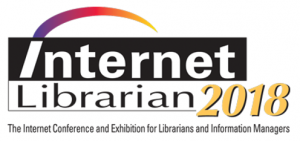 The Nebraska Library Commission is offering a group discount to all librarians in Nebraska who attend the 2018 Internet Librarian Conference. This year it will be held at the Monterey Marriott in Monterey, California, on October 16-18, 2018. Detailed information about the conference can be found on the conference web page at http://internet-librarian.infotoday.com/2018/
The Nebraska Library Commission is offering a group discount to all librarians in Nebraska who attend the 2018 Internet Librarian Conference. This year it will be held at the Monterey Marriott in Monterey, California, on October 16-18, 2018. Detailed information about the conference can be found on the conference web page at http://internet-librarian.infotoday.com/2018/
The price of the conference with the discount is $399 for the 3-Day Pass (regular rate is $549). No discount rates are available for the separately priced preconference workshops. However, the Gold Pass is available to groups at the discounted rate of $649 (regularly $789); this is the only pass to include preconference workshops. In addition, the discounted rate of $119 (regularly $209) on the Internet@Schools Track is also available.
To receive the discount you will need to register online using this link. Discounted rates should appear on the registration form. If you don’t see discounted rates on the form, please contact Susan Knisely for assistance. Online registrations can be made until September 14 to receive the discounted rates. Rates will go up by $20 after the deadline.
Posted in Education & Training
Leave a comment
Friday Reads: The Line Becomes A River: Dispatches from the Border, By Francisco Cantu
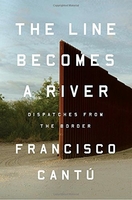 Francisco Cantu brings a unique perspective to his debut book, The Line Becomes A River, a nuanced exploration of the United States-Mexican border. In addition to being a third-generation Mexican-American who grew up near the border, Cantu studied international relations and border policy at American University, in Washington, D.C. After graduating with honors, he served in the United States Border Patrol from 2008 to 2012, working in Arizona, New Mexico, and Texas. More recently, in 2016, he earned an MFA in Nonfiction from the University of Arizona.
Francisco Cantu brings a unique perspective to his debut book, The Line Becomes A River, a nuanced exploration of the United States-Mexican border. In addition to being a third-generation Mexican-American who grew up near the border, Cantu studied international relations and border policy at American University, in Washington, D.C. After graduating with honors, he served in the United States Border Patrol from 2008 to 2012, working in Arizona, New Mexico, and Texas. More recently, in 2016, he earned an MFA in Nonfiction from the University of Arizona.
Given Cantu’s background and experience, he could have taken this book in many different directions; the route he chose, however, is that of a deeply personal memoir, described by reviewers as “heartfelt,” “lyrical,” “intimate,” “brutal,” and “heartbreaking.” It unfolds in three unnamed parts. Part one opens with Cantu attending training at the Border Patrol Academy, and it follows him during his initial field placements. While it includes numerous accounts of Cantu’s experiences with border crossers and fellow agents, part one is notably framed by two conversations with his mother, which establish the moral conflict at the heart of the entire narrative.
The first conversation occurs when Cantu is still in training at the academy. During her Christmas visit, Cantu’s mother struggles to understand why he wants to join the Border Patrol, which she refers to as “a paramilitary police force.” He responds: “I’m tired of studying, I’m tired of reading about the border in books. I want to be on the ground, out in the field . . . I don’t see any better way to truly understand the place.” His mother is clearly not convinced and is obviously worried about more than just his physical safety: “There are ways to learn these things that don’t put you at risk, she said, ways that let you help people instead of pitting you against them.”
The second conversation occurs at the end of part one, during a subsequent Christmas visit. When his mother asks if he likes the work and is learning what he wanted, he’s not up to having the conversation he knows she’s trying to initiate. And when she brings up “how a person can become lost in a job, how the soul can buckle when placed within a structure,” he cuts her off: “I was too exhausted to consider my passion or sense of purpose, too afraid to tell my mother about the dreams of dead bodies and crumbling teeth, . . . about my hands shaking at the wheel.”
By part two, Cantu has been promoted to doing intelligence work, first in Tucson, then in El Paso. Though he continues to recount his own experiences, his narrative increasingly focuses on the systemic violence haunting both sides of the border: the beheadings, massacres, and mass graves tied to drug cartels; and the kidnapping and ransoming of desperate border crossers by organized smuggling gangs capitalizing on stricter border enforcement. His teeth are a mess from constant grinding and his nightmares persist.
The narrative’s emotional climax occurs during part three. By this time, Cantu has quit the Border Patrol and returned to school, leaving his most intense stress behind. But completely outrunning the emotional trauma of border enforcement proves impossible. This time it affects Cantu personally, when agents detain his undocumented friend, Jose, who is trying to reenter the United States after visiting his dying mother in Mexico. Suddenly, Cantu is experiencing border enforcement from the perspective of the detainee, and the detainee’s family and friends. He does what he can to help Jose navigate the immigration and court systems, but current policies offer little recourse and his friend is deported.
In the third and final Christmas conversation with his mother, Cantu shares the pain, hurt, and conflict he feels over Jose’s situation: “I don’t know what to do, I confessed. I feel pain, I feel hurt, but it isn’t mine. . . . It’s like I never quit . . . It’s like I’m still a part of this thing that crushes.” His mother responds: “You can’t exist within a system for [four years] without being implicated, without absorbing its poison. . . So what will you do? All you can do is try to find a place to hold it, a way to not lose some purpose for it all.”
One gets the feeling this memoir—dedicated in part “to all those who risk their souls to traverse or patrol an unnatural divide”—may be one manifestation of Cantu’s effort to follow his mother’s advice.
Cantu, Francisco. The Line Becomes a River: Dispatches from the Border. New York: Riverhead, 2018.

